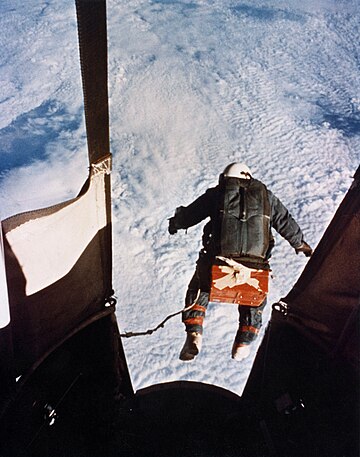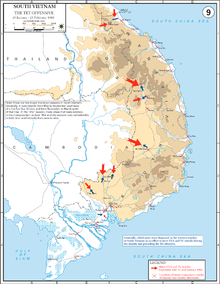Portal:1960s
The 1960s Portal
The 1960s became synonymous with the new, radical, and subversive events and trends of the period. In Africa the 1960s was a period of radical political change as 32 countries gained independence from their European colonial rulers. Some commentators have seen in this era a classical Jungian nightmare cycle, where a rigid culture, unable to contain the demands for greater individual freedom, broke free of the social constraints of the previous age through extreme deviation from the norm. Christopher Booker charts the rise, success, fall/nightmare and explosion in the London scene of the 1960s. However, this alone does not explain the mass nature of the phenomenon. Several nations such as the U.S., France, Germany and Britain turned to the left in the early and mid 1960s. In the United States, John F. Kennedy, a Keynesian and staunch anti-communist, pushed for social reforms. His assassination in 1963 was a stunning shock. Liberal reforms were finally passed under Lyndon B. Johnson including civil rights for African Americans and healthcare for the elderly and the poor. Despite his large-scale Great Society programs, Johnson was increasingly reviled by the New Left at home and abroad. The heavy-handed American role in the Vietnam War outraged student protestors across the globe, as they found peasant rebellion typified by Ho Chi Minh and Che Guevara more appealing. Italy formed its first left-of-center government in March 1962 with a coalition of Christian Democrats, Social Democrats, and moderate Republicans. Socialists joined the ruling block in December 1963. In Britain, the Labour Party gained power in 1964. In Brazil, João Goulart became president after Jânio Quadros resigned. This is a Featured article, which represents some of the best content on English Wikipedia..
The Voting Rights Act of 1965 is a landmark piece of federal legislation in the United States that prohibits racial discrimination in voting. It was signed into law by President Lyndon B. Johnson during the height of the civil rights movement on August 6, 1965, and Congress later amended the Act five times to expand its protections. Designed to enforce the voting rights protected by the Fourteenth and Fifteenth Amendments to the United States Constitution, the Act sought to secure the right to vote for racial minorities throughout the country, especially in the South. According to the U.S. Department of Justice, the Act is considered to be the most effective piece of federal civil rights legislation ever enacted in the country. The National Archives and Records Administration stated: "The Voting Rights Act of 1965 was the most significant statutory change in the relationship between the federal and state governments in the area of voting since the Reconstruction period following the Civil War". The act contains numerous provisions that regulate elections. The act's "general provisions" provide nationwide protections for voting rights. Section 2 is a general provision that prohibits state and local government from imposing any voting rule that "results in the denial or abridgement of the right of any citizen to vote on account of race or color" or membership in a language minority group. Other general provisions specifically outlaw literacy tests and similar devices that were historically used to disenfranchise racial minorities. The act also contains "special provisions" that apply to only certain jurisdictions. A core special provision is the Section 5 preclearance requirement, which prohibited certain jurisdictions from implementing any change affecting voting without first receiving confirmation from the U.S. attorney general or the U.S. District Court for D.C. that the change does not discriminate against protected minorities. Another special provision requires jurisdictions containing significant language minority populations to provide bilingual ballots and other election materials. (Full article...)This is a Good article, an article that meets a core set of high editorial standards.
The Partial Test Ban Treaty (PTBT), formally known as the 1963 Treaty Banning Nuclear Weapon Tests in the Atmosphere, in Outer Space and Under Water, prohibited all test detonations of nuclear weapons except for those conducted underground. It is also abbreviated as the Limited Test Ban Treaty (LTBT) and Nuclear Test Ban Treaty (NTBT), though the latter may also refer to the Comprehensive Nuclear-Test-Ban Treaty (CTBT), which succeeded the PTBT for ratifying parties. Negotiations initially focused on a comprehensive ban, but that was abandoned because of technical questions surrounding the detection of underground tests and Soviet concerns over the intrusiveness of proposed verification methods. The impetus for the test ban was provided by rising public anxiety over the magnitude of nuclear tests, particularly tests of new thermonuclear weapons (hydrogen bombs), and the resulting nuclear fallout. A test ban was also seen as a means of slowing nuclear proliferation and the nuclear arms race. Though the PTBT did not halt proliferation or the arms race, its enactment did coincide with a substantial decline in the concentration of radioactive particles in the atmosphere. (Full article...)Selected picture - Joseph Kittinger sets world records for the highest parachute jump, the longest parachute drogue fall and the fastest speed by a human through the atmosphere after jumping from Excelsior III.
Did you know -
Related portalsThis is a Featured article, which represents some of the best content on English Wikipedia..
John Herschel Glenn Jr. (July 18, 1921 – December 8, 2016) was an American Marine Corps aviator, astronaut, businessman, and politician. He was the third American in space, and the first American to orbit the Earth, circling it three times in 1962. Following his retirement from NASA, he served from 1974 to 1999 as a U.S. Senator from Ohio; in 1998, he flew into space again at the age of 77. Before joining NASA, Glenn was a distinguished fighter pilot in World War II, the Chinese Civil War and the Korean War. He shot down three MiG-15s, and was awarded six Distinguished Flying Crosses and eighteen Air Medals. In 1957, he made the first supersonic transcontinental flight across the United States. His on-board camera took the first continuous, panoramic photograph of the United States. (Full article...)This is a Good article, an article that meets a core set of high editorial standards.
Stanley Kubrick (/ˈkuːbrɪk/; July 26, 1928 – March 7, 1999) was an American filmmaker and photographer. Widely considered one of the greatest filmmakers of all time, his films were nearly all adaptations of novels or short stories, spanning a number of genres and gaining recognition for their intense attention to detail, innovative cinematography, extensive set design, and dark humor. Born and raised in New York City, Kubrick was an average school student but displayed a keen interest in literature, photography, and film from a young age; he began to teach himself all aspects of film producing and directing after graduating from high school. After working as a photographer for Look magazine in the late 1940s and early 1950s, he began making low-budget short films and made his first major Hollywood film, The Killing, for United Artists in 1956. This was followed by two collaborations with Kirk Douglas: the anti-war film Paths of Glory (1957) and the historical epic film Spartacus (1960). (Full article...)Selected article -The Tet Offensive was a major escalation and one of the largest military campaigns of the Vietnam War. The Viet Cong (VC) and North Vietnamese People's Army of Vietnam (PAVN) launched a surprise attack on January 30, 1968 against the forces of the South Vietnamese Army of the Republic of Vietnam (ARVN), the United States Armed Forces and their allies. It was a campaign of surprise attacks against military and civilian command and control centers throughout South Vietnam. The name is the truncated version of the Lunar New Year festival name in Vietnamese, Tết Nguyên Đán, with the offense chosen during a holiday period as most ARVN personnel were on leave. The purpose of the wide-scale offensive by the Hanoi Politburo was to trigger political instability in a belief that mass armed assault on urban centers would trigger defections and rebellions. The offensive was launched prematurely in the early morning hours of 30 January in large parts of the I and II Corps Tactical Zones of South Vietnam. This early attack allowed allied forces some time to prepare defensive measures. When the main operation began during the early morning hours of 31 January, the offensive was countrywide; eventually more than 80,000 PAVN/VC troops struck more than 100 towns and cities, including 36 of 44 provincial capitals, five of the six autonomous cities, 72 of 245 district towns and the southern capital. The offensive was the largest military operation conducted by either side up to that point in the war. (Full article...)More Did you know (auto generated)
TopicsCategoriesWikiProjects
Associated WikimediaThe following Wikimedia Foundation sister projects provide more on this subject:
Discover Wikipedia using portals |






























